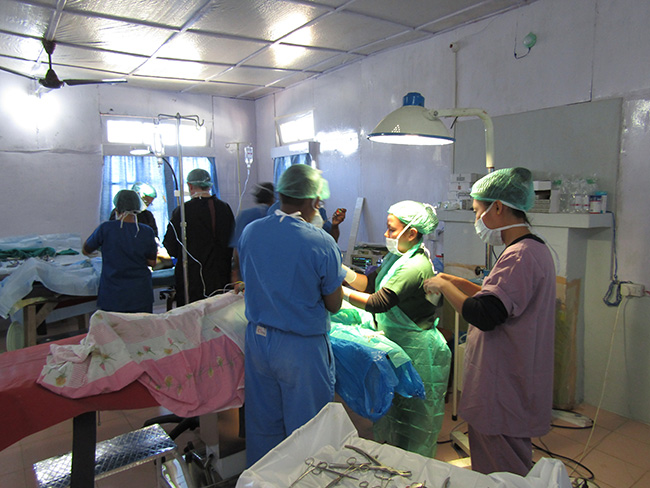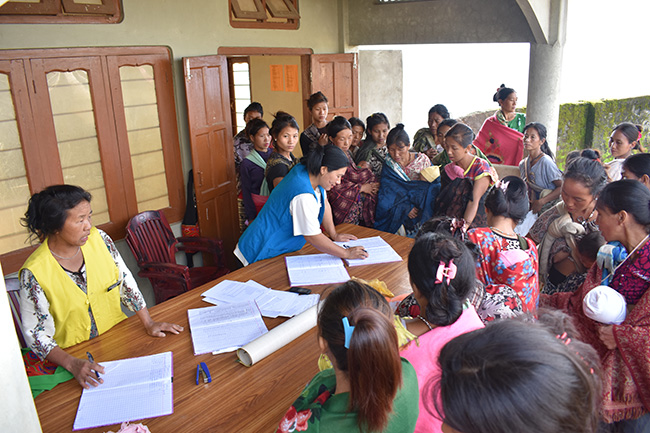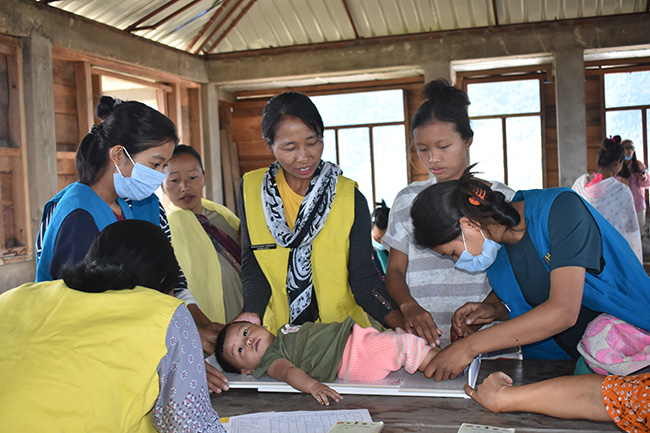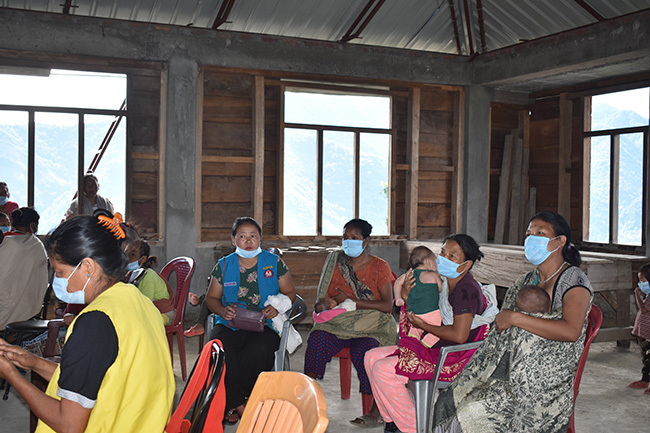New Delhi: “It was the most difficult funeral that I had to perform as a pastor. A few months old baby had died because of hunger as the mother had no money to buy rice. So, she had to catch some fish and sell it to buy rice. However, by the time she bought the rice and came back home, the baby had taken her last breath. The mother could not accept that her child was no more and she kept crying. I felt overwhelmed with guilt and started questioning the governance and social systems in our region,” said 51-year-old Reverend Dr (PhD) Chingmak Kejong, Founder and Secretary of Eleutheros Christian Society, popularly known as ECS in Nagaland. According to Dr Kejong, this incident that happened in the early 1990s reinforced what his wife Phutoli Shikhu has been suggesting to him for a long time – to leave his work as a pastor in the church and do something constructive for the betterment of the community that was badly affected by the drug abuse, HIV/AIDS, poverty, insurgency, illiteracy, open defecations, high infant and maternal mortality, a number of diseases and no healthcare whatsoever. Dr Kejong decided to follow her advice and took a step towards changing the situation in his district Tuensang which is one of the remotest and most backward districts of the country.

Reverend Dr Chingmak Kejong founded Eleutheros Christian Society (ECS) in Tuensang, Nagaland in 1993
Dr Chingmak met his wife while pursuing theology in Pune. They were among the very few people from Tuensang in the 1980s who got a chance to pursue higher education as both of them belonged to well-off families of their tribes. They got married in their early 20s and started working in a church in Tuensang with the aim to serve the people. However, due to the increasing drug trafficking and insurgency- wars among tribal communities and against the government, the couple, along with many other families were facing a difficult time and decided to start ECS in 1993.
Tackling Difficult Times In The Difficult Terrains
Further explaining about the socio-political situation in Nagaland when they founded ECS, Dr Chingmak who belongs to the Chang tribe said,
In the early 1990s, the streets of Tuensang, Nagaland were like actual battlefields. There were firings happening and everyone would be running around. In August 1990, clashes between tribes left many dead. Also, because of the porosity of its borders with Myanmar, it remained vulnerable to the activities of the transcontinental drug mafia. Drug abuse was a huge problem. So, very sadly, every third family had a drug user and it really affected the region. Also, with no air or rail connectivity and poorly maintained roads, the Tuensang district was easily overlooked by everyone. It was a completely isolated community. So, our response was a very organic response to the problems we were facing. We did not think that we should start an NGO. It was just families coming together and responding to our own problems.
Tuensang is Nagaland’s eastern most district covered with forest and hills, just 25 kilometres from the Myanmar border. While it is geographically, Nagaland’s largest district, accounting for about 26 per cent of the state’s land mass, the population density is low. With a population 1.9 lakh, according to the Population Census 2011, Tuesang, is home to several tribes and accounts for just 10 per cent of Nagaland’s population. It is one of the most marginalised in Nagaland and is also among India’s 150 most backward districts. According to Dr Chingmak, since the district is on the very fringes of the state, the policymakers have not given much attention to it. A distance of 200 kilometres of extremely difficult terrain separated Tuensang district from the Nagaland capital of Kohima, where all state policies are made. Since the British rule, the focus has been on urban centres like Kohima and the Tuensang region was regarded as a distant belt inhabited by ungovernable tribals, he said. He added that there was no means of livelihood for people except for little agriculture. People lived in close proximity to the animals they reared and there were no sanitation facilities because of which open defecation was the norm. Epidemics broke out regularly affecting children the most. HIV/AIDS was another major problem facing Tuensang in the early 1990s. Dr Chingmak, who lost his two brothers to AIDS said,
Nobody in the state wanted to talk about HIV/ AIDS at that point, even while a pandemic was staring Nagaland in the face. Among the intravenous drug users, HIV was as high as 70 per cent and among pregnant mothers, it was almost 8.6 per cent. Anything above 1 per cent is considered dangerous. How would you describe almost 8.6 per cent of pregnant women as HIV positive? It was a very serious problem. While doing this work we came to realise that the government had not invested in primary health which is the backbone of any healthcare intervention. While Kohima had 1 doctor for every 3,000 people, Tuensang had 1 doctor for 35,000 people. So, we realised that unless we address primary healthcare, the community will always remain vulnerable to some or the other disease. So, we built two teams- one to completely focus on HIV/AIDS and drugs problem and the other to focus on primary healthcare, nutrition, sanitation, education and livelihood.
One of the things that Dr Chingmak learnt from his work in the initial days itself was that raising awareness alone was not enough and so, in order to build the care-seeking behaviour among the otherwise hesitant tribals, the services must also tally. He said,
So, we started working with drug users and HIV became a major issue. Even in the conflict situation, we ensure that the CD4 count machine is there for the HIV patients, the viral load machine is there which is around Rs. 8 crore, and antiretroviral medication for HIV positive was ensured. We built bridges and roads for the people to reach healthcare centres faster. So far, we have built five roads and six bridges to help people access health.
Dr Chingmak added that personal hygiene and sanitation and public cleanliness were high on the priority list of ECS from the very beginning. People working at ECS went from home to home to inquire into the hygiene practices being followed by local families, whether hands were being washed before meals, and so on. To encourage the building of toilet facilities, ECS provided the prevailing minimum wage for four days to every family which built its own toilet.
ECS Focuses On Making Government Programmes Functional Through Community Engagement
Eleutheros in Greek means, to free someone from poverty and suffering. Since its founding, the organisation has been on the mission of uplifting the tribal people in the region. Now working extensively in 84 villages across three districts- Mon, Tuensang and Longleng, ECS is actually impacting people in the nearby villages also, so in total 200 villages. It has been following a self-sustainable model for making the existing government programmes functional in the district through community engagement. Dr Chingmak said,
Church and bureaucracy, contrary to the popular impression of them as insensitive and corrupt, was actually very supportive of the work done by the ECS. We collaborated with the government for executing their programmes in the tribal belt. We have been receiving support in terms of funding, technology and direction from various organisations since the beginning. We have partnered with ActionAid India, Sir Rattan Tata Trust, Sir Dorabjee Tata Trust, Bill and Melinda Gates Foundation, and Wipro among others for various programmes on nutrition, maternal and child care, public health, education, agriculture and livelihood. During the early years, ECS was awarded a big grant from HCL for health which proved to be a game-changer as we expanded our health work to many villages with its help. In the later 1990s, NACO (National AIDS Control Organisation) offered a big grant to ECS in the battle against HIV/AIDS.
According to Senti Tzudir, Coordinator at ECS, the organisation has always executed all of the projects successfully because of active community participation. He said,
I have been working with ECS since the beginning and I have seen things become better over the years in the district. We even involved the church in overcoming the stigma attached to HIV/AIDS infections and in rehabilitating those affected. Implemented a successful public healthcare model with community engagement, and conducted surgery camps to improve the quality of life of hundreds of patients by providing the much-needed surgical care that they could not afford otherwise. ECS has also revived the traditional school system in over 200 villages of Nagaland paving the way to more students opting for higher education.
He further said that ECS was able to gain the confidence of the community that was divided by the multiple tribal subdivisions and brought them on the single platform for tackling the issues facing them together.

ECS conducts surgery camps to improve the quality of life patients by providing the much-needed surgical care that they could not afford otherwise
According to Dr Chingmak, there is a provision of Village Development Councils under the Government of India which mandates that every village should have these councils. ECS made the most of these councils in executing, monitoring and assessing the functions of government programmes and systems like Primary Healthcare Centres, Mid Day Meals, ICDS (Integrated Child Development Services), mothers’ complementary feeding programmes, immunisation and education. He said,
Primary Healthcare Centres (PHCs) adopted by ECS in 84 villages provide health access to people in 200 villages across Mon, Tuensang and Longleng districts. These PHCs run entirely on the self-sustainable model in which from doctors, lab technicians, to cooks, drivers, every staff member is appointed by the villagers themselves and the government does the payment. According to Dr Chingmak, learned people in the village including experts in the medical field form an interview board, shortlist candidates and take final approval from the villagers in village meetings. This shows us that communities can rally around and work. Today I am proud to say that we have a cluster of primary healthcare centres owned by communities and are run by the communities across three districts. Every day, in around 450 schools, mid-day meals are being prepared and served by the community itself. I believe that if we give ownership to communities then, they really stand on their own, even if it is a backward area or a conflict zone.

ECS follows a self-sustainable model for making the existing government programmes functional in the district through community engagement
Dr Chingmak further said that in every village where ECS is working, they have linked each household to the Rashtriya Swasthya Bima Yojana (RSBY) insurance programme of the government of India and free medicines and treatment was provided to those who come to the health centres with the RSBY card.
While talking about how ECS helped her in delivering a healthy baby, Sungmo Kundang, a 30-year-old mother from Konya Village in Tuensang said that when she was pregnant, the village health worker who was working with ECS suggested her to visit the Anganwadi centre run by ECS in order to get the supplementary nutrition but she did not pay heed to the advice at first as she was too busy with the farm and household work.
It was only in my second trimester that I finally visited the feeding centre. When the workers took my weight as a routine procedure for pregnant women, they were shocked to see that it was only 34 kilograms. There I was provided with food and nutritional supplements and was encouraged to visit regularly. They also gave me valuable guidance on pregnancy care, the importance of eating a proper diet and safe delivery methods. Three months into the program, I could feel the changes in my health and noticed the increase in my weight. When I was due for delivery, they encouraged me to deliver at the hospital which I willingly did. I went to the Civil hospital in Tuensang and there I delivered a healthy baby weighing 3.3 kgs.
Ms Kundang added that if it was not for the support of the ECS’s health workers, the outcome of her pregnancy may have been different. She said that through this experience, she realised the importance of diet during pregnancy and also learnt about the importance of getting her child immunised.
During the COVID-19 pandemic also, ECS joined hands with the community to fight transmission. Along with awareness building, ECS donated N95 face masks to the people and to the district administration for the frontline workers in the district.
Also Read: Meet Dr Rani Bang And Dr Abhay Bang, Pioneers Of Maternal And Child Health Among Tribal Communities
From Taking A Bullet To Becoming A Hero For Many, What Keeps Dr Kejong Motivated
Known for his incredible work at the grassroots, Dr Chingmak has learnt the true sense of working in the most marginalised and conflict-ridden zone. During his journey as a leader of a revolution for the upliftment of the backward tribal belt of Nagaland, Dr Chingmak had to deal with failing governments as well as radical insurgent groups. He said,
One day, in 2003, I got an envelope with a point 22 bullet in it and an anonymous note threatening to stop my work. Apparently, our work against drug trafficking offended some insurgent groups. It shook me a bit and I really wondered who are these people who don’t want the youth of their communities to live a better life. That evening around 9 pm I got a call on our landline. Tuensang being a backward district ridden with conflict, everything used to get shut by 7 pm and so 9 pm was quite a late hour in the day for the people. My wife got really scared thinking it was a call from the person who sent me the bullet that day. However, I picked up and the person on the other side told me that the Governor of Nagaland wants to meet me to award ECS with the Governor’s medal of honour and that the then president Dr A. P. J. Abdul Kalam took note of our work and wanted to meet me at the Raj Bhawan. That call instilled hope and encouragement in me, which I felt I was losing by the threat I received earlier that day.
Dr Chingmak said that hard work and being persistent really mattered to him and watching the community increase their engagement in activities that lead to their own betterment every day is what keeps him motivated. Dr Chingmak further said,
After six years of that bullet incident, on a rather windy day, I was working in my office in the afternoon. Because the winds were strong, I got up to put the stopper on the front door of ECS’s health centre. I saw a man in a trench coat and a cowboy hat with two huge bodyguards. He barged into my office and demanded to get tested for HIV and asked for medication. I was puzzled and honestly, a bit scared too. I called my colleague on the intercom and asked a nurse to come and take the blood sample for an HIV test. That man asked me ‘Do you recognise me?’ I said no. He said ‘I am the man who sent you that envelope. I am very sorry for what I did. I feel very ashamed.’ I told him we will provide all the medical help he needs. He continued antiretroviral therapy (ART) with us for a month but after that till today, we don’t know where he is.

Personal hygiene and sanitation and public cleanliness were high on the priority list of ECS from the very beginning
Dr Chingmak, who has now become a household name in Tuensang, said that one of the major learnings he had from the work done by him over the past three decades is that in order to address the issue of health, the country as a whole needs to invest in strengthening the primary healthcare and engage the communities. He said while signing off,
Ultimately, whether it was about ending discrimination against those living with HIV/ AIDS or ensuring personal hygiene and sanitation or improving healthcare, nothing could happen without the community’s support.
Also Read: Meet The 43-Year-Old Doctor Who Aims To Provide Health For All In Remote Areas Of Ladakh
NDTV – Dettol have been working towards a clean and healthy India since 2014 via the Banega Swachh India initiative, which is helmed by Campaign Ambassador Amitabh Bachchan. The campaign aims to highlight the inter-dependency of humans and the environment, and of humans on one another with the focus on One Health, One Planet, One Future – Leaving No One Behind. It stresses on the need to take care of, and consider, everyone’s health in India – especially vulnerable communities – the LGBTQ population, indigenous people, India’s different tribes, ethnic and linguistic minorities, people with disabilities, migrants, geographically remote populations, gender and sexual minorities. In wake of the current COVID-19 pandemic, the need for WASH (Water, Sanitation and Hygiene) is reaffirmed as handwashing is one of the ways to prevent Coronavirus infection and other diseases. The campaign will continue to raise awareness on the same along with focussing on the importance of nutrition and healthcare for women and children, fight malnutrition, mental wellbeing, self care, science and health, adolescent health & gender awareness. Along with the health of people, the campaign has realised the need to also take care of the health of the eco-system. Our environment is fragile due to human activity, which is not only over-exploiting available resources, but also generating immense pollution as a result of using and extracting those resources. The imbalance has also led to immense biodiversity loss that has caused one of the biggest threats to human survival – climate change. It has now been described as a “code red for humanity.” The campaign will continue to cover issues like air pollution, waste management, plastic ban, manual scavenging and sanitation workers and menstrual hygiene. Banega Swasth India will also be taking forward the dream of Swasth Bharat, the campaign feels that only a Swachh or clean India where toilets are used and open defecation free (ODF) status achieved as part of the Swachh Bharat Abhiyan launched by Prime Minister Narendra Modi in 2014, can eradicate diseases like diahorrea and the country can become a Swasth or healthy India.
[corona_data_new]





















